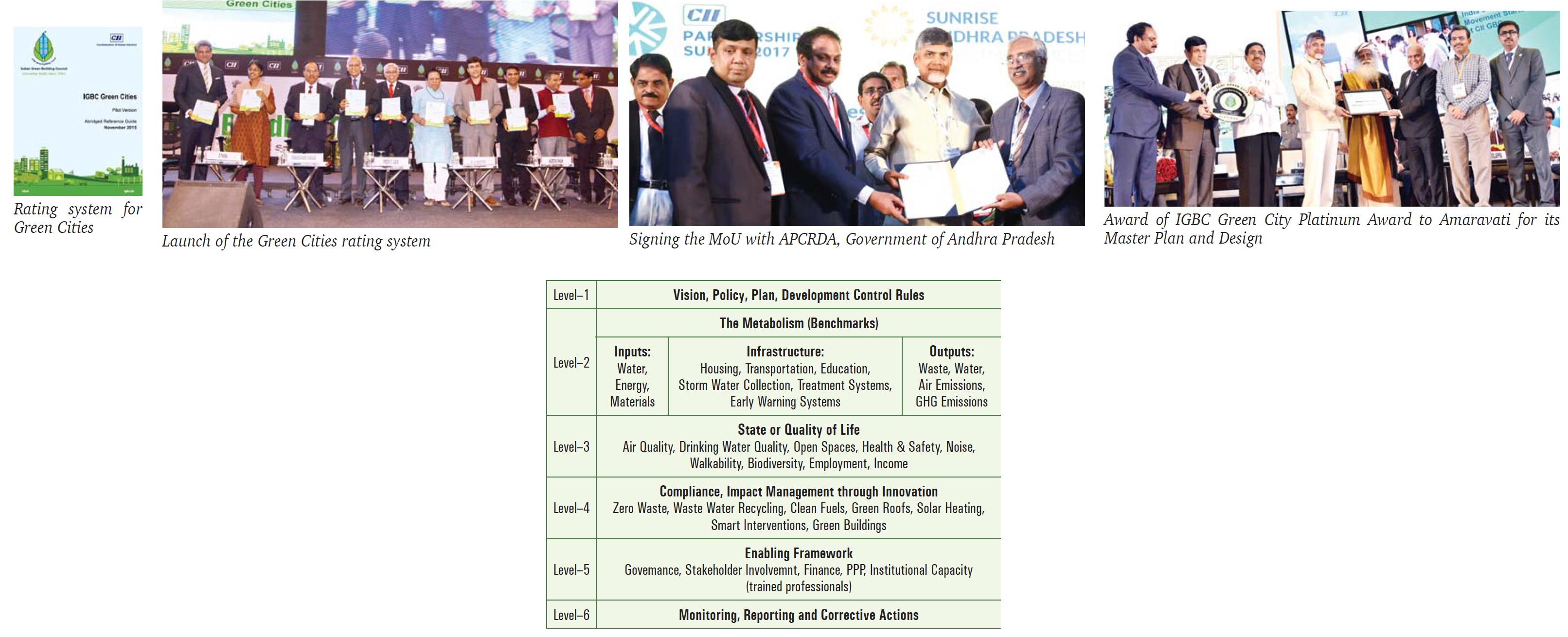M. Anand Principal Counsellor, CII – Indian Green Business Council (IGBC)
Dr. Prem C. Jain Chairman, Indian Green Building Council
Introduction
Spearheading the green building movement in India is Indian Green Building Council (IGBC), part of CII. As a result of concerted efforts, IGBC with over 5.27 billion sq.ft. has facilitated India to have the world’s second largest registered green building footprint. IGBC aspires to facilitate 10 billion sq.ft. of green building footprint by 2022, to be the world leader. In order to realize this aspiration, IGBC is working closely with stakeholders in greening various forms of built environment. Addressing this imperative, IGBC has recently launched an exclusive rating system for greening of upcoming and existing cities.
IGBC Green Cities Rating System
‘IGBC Green Cities Rating Systems’ (for new and existing cities) enable the development authorities and developers to apply green concepts and planning principles so as to reduce environmental impacts and improve the overall quality of life. The framework for green city provides long term vision for systematic planning, implementation and management of green cities.
Broad Framework for a Green City
Cities are encouraged to convert environmental problems into opportunities and apply appropriate solutions. The Green Cities concept seeks to promote eco-friendly cities that balance social, economic, and environmental dimensions, as well as good urban governance, as their foundation. One of the key focus areas that need to be stressed is optimal and efficient use of natural resources like water, energy and land based buildings. Urban planners, urban designers and architects must work in close collaboration with local administrations and communities to ensure that integrated planning and design thinking is undertaken to conceive a city based on sustainable and green planning
principles. In this context, emerging cities have the opportunity to set a strong eco-vision that can be transformed into a long-term plan from day one itself.
Anticipated Benefits of Green Cities
Efficient Land Use
Green Cities promote effective land use by encouraging land use mix and higher densities to ensure compact development. These planning concepts are gaining prime importance, offering multiple benefits:
• Higher density and compact development
• Transit oriented development
• Preservation and restoration of water bodies and eco-sensitive zones
• A variety of housing typologies on offer
• Reduced distance between home and workplace to encourage walking-to-workplace
• Pedestrian and bicycle-friendly environment
• Stronger neighbourhoods, enhancing community bonding
Energy Efficiency
Power generation using various renewable energy technologies and green concepts can significantly reduce the power demand of the city, leading to energy savings to the tune of 20-30%.
Water Efficiency
Green Cities achieve potable water savings to the tune of 30-40% by adopting practices such as the use of low-flow fixtures, rain water harvesting, treatment and reuse of waste water and storm water management.
Efficient Mobility
Green Cities increase opportunities for walking and bicycling on a pedestrian friendly network, reduction in the number of automobile trips, promoting public transportation and use of vehicles with alternative fuels. In short, efficient transportation planning enables cities to accommodate all modes of travel including walking, bicycling and public transportation that are vital for reducing the carbon footprint of cities.
Enhanced Quality of Life
Reduced commuting time, accessible recreational spaces, increase in green cover and continuous environmental monitoring enhance the quality of life, thereby making the cities healthier and more liveable.
Amaravati, the People’s Capital
Amaravati, the people’s capital of Andhra Pradesh, is envisioned to be the pioneer Smart City and economic hub of India, with world-class infrastructure and high livability quotient in an environmentally sustainable manner while capitalizing on its rich heritage. It is designed by Fosters & Partners, and is noteworthy for its trunk infrastructure and integration of blue and green master plans. CII – Indian Green Building Council (IGBC) is partnering with Andhra Pradesh Capital Region Development Authority (APCRDA) in promoting Amaravati as a Green and Smart City. At Partnership Summit 2017, CII-IGBC inked an MoU with the Government of Andhra Pradesh for developing Amaravati as a model green and smart city. The proposed activities under the MoU would include capacity building and training programs for engineers, architects and developers; facilitating investments and entrepreneurs in the field of green buildings and green cities; facilitating implementation and achievement of IGBC green ratings for upcoming building for all applications in Amaravati and for the city as a whole.
Training Programs
As a part of the capacity building session, CII-IGBC organized training programs on IGBC Green City and Green Building concepts for APCRDA offi cials, aimed at implementing all Green Measures in Amaravati for the achievement of ‘Net Zero Energy City’ and incorporation of IGBC Green Building rating system guidelines in the design and implementation of the city. Amaravati City was conferred CII-IGBC Green City Platinum Award for its Master Plan and Design at Happy Cities Summit 2018 on April 10 at Amaravati. This milestone was achieved with the support, guidance and involvement of Vijaya Sai Meka, Chair – IGBC Amaravati and Chowdari, Co- Chair – IGBC Amaravati Chapter. Amaravati City, which is being designed as per IGBC Green Cities rating system norms, will have several innovative and futuristic green features, including the following:
1. The city has a detailed plan with list of strategies for preservation and restoration of existing water bodies (rivers, canals, tanks and lakes) including natural drains and channels feeding the water bodies. It includes strategies to preserve and restore eco-sensitive zones and measures to prevent encroachment of water bodies.
2. Balance of bluing with greening: 35% of developable area allocated for public green and open spaces.
3. Implementation plan for 100% waste segregation: the city’s vision is to become a zero waste city by 2050.
4. Pedestrian pathways and cycle tracks along a majority of the road network.
5. Barrier-free accessibility for public buildings and public toilets.
6. 24x7 water supply, 100% metered connections and 100% treatment of waste water and its reuse in the city.
7. Dedicated storm water drainage network for 100% storm water conveyance within the city, and more than 95% of the water to be harvested at city level.
8. Amaravati’s vision is to source 60% of its total energy requirement from renewable energy sources. It has planned for 24x7 uninterrupted power supply, smart grid with distributed renewable energy sources, LED street-lighting, and smart metering with SCADA system.
9. Digitalized city where information and communication technology (ICT) solutions are used to sense, analyse and integrate various key information in core systems of the urban operation.
10. District cooling is proposed for a 900 acre government complex.
11. IGBC Green Cities Rating Systems encourage concepts and features that are a blend of ancient architectural practices and modern technological innovations. It adopts a holistic approach towards the design and construction of the city. Dholera City in Gujarat, New Town in Kolkata, Bhopal in MP, GIFT City in Gujarat and Sri City in Andhra Pradesh are some other projects registered with IGBC. All these cities are designed for measurable reduction in environmental impacts that significantly improve the overall quality of life.
In days to come, Amaravati would be a much sought after city for all national and international stakeholders who wish to enhance the quality of life and offer new growth opportunities to their citizens and play a catalytic role in addressing ecological issues and concerns. IGBC is honoured to partner with the Government of Andhra Pradesh in building a greener and healthier India.
Disclaimer: The information provided within this publication / eBook/ content is for general informational purposes only. While we try to keep the information up-to-date and correct, there are no representations or warranties, express or implied, about the completeness, accuracy, reliability, suitability or availability with respect to the information, products, services, or related graphics contained in this publication / eBook/ content for any purpose. Any use of this information is at your own risk.
 Youth
Youth
 Women
Women
 Research for Ishrae
Research for Ishrae







